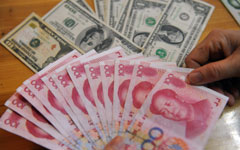Skeptics may argue that the quotas set by China limit the scale and relevance of the TTP. But it is important to note that the quotas are net amounts, not gross, and that underlying trading value can be many times greater.
For policymakers, it is easier to bring about changes when a market is either fully open or fully closed. It is a different matter when a market is trying to move from one spectrum to another, where far more risks need to be taken. It is true that by imposing quotas, China has stopped short of completely opening-up of its capital account. Yet, quotas are necessary to manage the transition from a closed economy to an open one - not to mention this is an economy worth 57 trillion renminbi and second in size only to the US. Even the smallest degree of change in China's policy could have tectonic-shift implications for it, and send ripple effects in markets across the world.
 |
 |
The opening of stock trading will bring about a different approach to the QFII/Qualified Domestic Institutional Investor arrangement. QFII offers a new avenue to directly invest in mainland and Hong Kong stocks, while QDII still has its intrinsic portfolio value as it spans across a wider spectrum of investment alternatives, including bonds and futures.
On the horizon is also the introduction of a "mutual recognition" program which would allow Hong Kong-based mutual funds to raise money from mainland investors and vice-versa. All these are progressive examples of China's willingness to experiment different policy variations in the journey to open up its economy.
The TTP is part of China's bigger reform train that has a strong forward momentum and no reverse gear. It should be clear that the opening up of China's capital account is an irreversible journey, just like the internationalization of the renminbi, which has taken place at breakneck speed over the past few years.
This program is not perfect, though. Questions will be asked on and concerns voiced over the application quota, and what happens when quotas are reached. Inevitably, any quota system will create distortions and may induce unnecessary pain. Investors should brace themselves for bumps along the way instead of shying away from participating in this significant journey toward China's market liberalization. What lies ahead will be well worth the ride.
The author is CEO of Greater China and Hong Kong, Standard Chartered Bank. The opinions expressed on this page do not necessarily reflect those of China Daily.
|
 |
 |
| Top 10 countries with highest GDP in 2013 | Top 10 regions with highest GDP in China |
